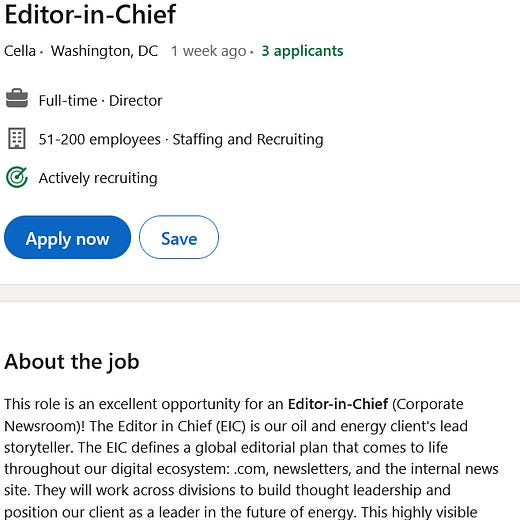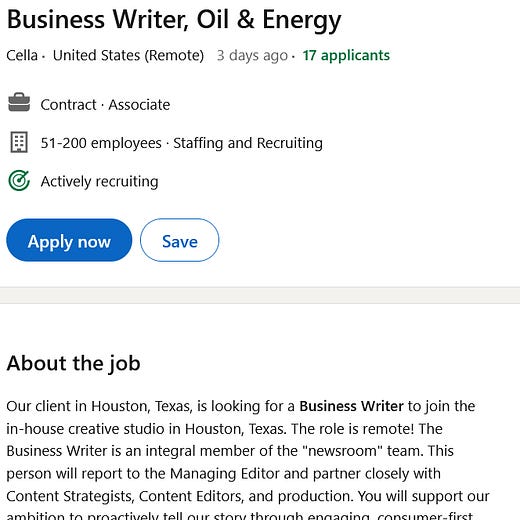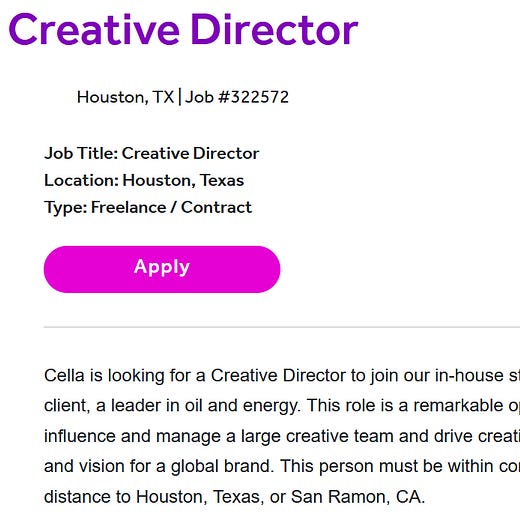“News,” brought to you by Chevron
In Richmond, California, a window into the future of fossil fuel propaganda.
Emily Sanders is editorial lead for the Center for Climate Integrity. You can catch up with her on Twitter here.
Chevron isn't just a gargantuan producer of oil and gas anymore — the company now wants to get into the business of reporting the “news”.
The oil giant is hiring journalists to help assemble its new “newsroom,” according to reporting from E&E after one of the outlet’s own writers was approached for the job earlier this month. The company’s goal is to “proactively tell the story of Chevron through engaging, consumer-first digital content,” a Chevron spokesperson told Earther.
Big Oil pushing its narrative under the mantle of journalism is a particularly unsettling prospect — and a clever pivot for oil giants facing increasing pressure over their work to defraud consumers, communities, and lawmakers about their climate and environmental impact.
Just last week, the House Oversight and Reform Committee announced that it would hold a second hearing into the fossil fuel industry’s campaigns to spread climate disinformation, focused specifically on whether the industry is “misrepresenting” its climate commitments. Campaigns are underway to force top PR agencies to cut ties with major climate polluters, or at the very least stop promoting their greenwashing. And throughout the country, states and municipalities are suing Big Oil for lying about the dangerous climate consequences of its products.
Reporting and journalism are a foundational reason that the public and policymakers are aware of Big Oil’s history of climate deception and have begun a movement to hold the industry accountable. But what happens when Big Oil is the one delivering the “news”?
For the residents of Richmond, California, that prospect is already reality. The city’s local “newspaper,” the Richmond Standard, is owned by Chevron, whose massive footprint on the city includes one of California’s most polluting refineries.
Chevron’s nearly century-old Richmond oil refinery is notorious for consistent EPA violations and local catastrophes. In 2012, an explosion at the refinery sent more than 15,000 residents to the hospital. Just last year, a pipeline at the refinery spilled 750 gallons of oil across several miles of the San Francisco Bay.
To prevent regulation of its refinery, Chevron previously employed more familiar industry tactics, like pouring millions of dollars into local elections and suing regulators. But members of Richmond’s community, predominantly working class and people of color, are fighting back because their lives are at stake, says Andrés Soto, Richmond organizer for environmental justice group Communities for a Better Environment. The city’s residents are plagued with elevated rates of cancer, and its children have about twice the rate of asthma as others across the county, while neighborhoods around the refinery are in the 99th percentile for asthma rates in the state.
Today, the company has taken a “more subtle, psychological approach to influencing and controlling Richmond,” Soto says — backing trusted community groups in exchange for their support, co-opting environmental justice initiatives in order to derail them, and starting a local newspaper to push a Chevron-friendly narrative.
The Chevron-owned Richmond Standard tells a starkly different story of Chevron’s relationship with the community. A page on the site called “Richmond Refinery Speaks” boasts the company’s donations to the community, interviews with smiling employees, and celebrations of “diversity” at the refinery, including an homage to Filipino culture. The page touts Chevron’s contributions to COVID-19 relief funds, but neglects to mention the link between air pollution and increased risk of death from the virus, or the company’s unwillingness to save Richmond’s only public hospital, which has since shut down.
Even since Chevron began a controversial $1 billion “modernization” of the refinery, promising to improve pollution in the area, toxic flaring incidents are a frequent occurrence, sometimes lasting for days on end. Still, the Richmond Standard presents a different version of reality; a page on the site hosts a “community guide to understanding refinery flares” to “help residents better understand what flaring is, what we do to prevent it, and how we minimize it.”
“They use this as a way to try to minimize the danger to the community that flaring represents, and try to reassure people that this is just a standard kind of safety procedure, nothing to see here,” Soto, the local organizer, said. “And we know that’s not true.”
Today, the battle isn’t just to retire Chevron’s polluting refinery, but to hold the company and other oil giants accountable for their outsized role in the climate crisis bearing down on those same communities.
Soto cites climate-worsened wildfires as perhaps the second most traumatic experience for Richmond after the horrendous refinery fire of 2012. “We've gone through several wildfire seasons now where the smoke comes down here to the Bay Area,” he said. “It is so dense and big and pervasive. It literally blocks out the sun and the sky is this reddish orange color. People have to stay indoors — it's a massive shelter in place.”
In 2018, Richmond filed a climate liability lawsuit against Chevron and 28 oil and gas giants to make them pay their fair share of the costs to adapt to mounting climate damages now facing the city, such as rising temperatures, wildfires, more frequent flooding, and sea-level rise along its 40-mile bay shoreline.
A search for “climate change” on the Richmond Standard’s website, however, garners scant results. “Chevron has denied any responsibility for climate change,” Soto said. “And in the meantime, they're profiting while our health continues to suffer.”
Chevron and other corporate polluters have tried to co-opt the news before.
The oil and gas industry has a legacy of hiding their propaganda in existing journalistic outlets; placing “advertorials,” or advertisements posing as editorials, in prominent newspapers like The New York Times, or sponsoring content in well-read political newsletters. In the lead-up to last year’s congressional hearing on climate disinformation, for example, Big Oil ramped up its advertising in Beltway newsletters like POLITICO Morning Energy, Axios Generate, and Punchbowl, with Chevron as their most prolific fossil fuel sponsor, according to a joint analysis by Earther and HEATED.
But Chevron’s latest moves indicate a changing and potentially even more dangerous dynamic: as local newspapers face a precipitous decline, wealthy corporations may be looking to fill the void. The U.S. Chamber of Commerce, which has for decades aided Big Oil in its campaigns to spread climate disinformation and is now using various tactics to defend oil companies from accountability, has its own collection of local “newsrooms,” which it uses to disseminate its message — “outlets” with names like the Louisiana Record, Pennsylvania Record, Southeast Texas Record, and so on.
Corporations becoming the major source of reporting in regions with limited access to news is “a tremendous danger,” in the words of Ed Wasserman, professor of journalism and former dean of the Graduate School of Journalism at the University of California, Berkeley.
By creating their own papers with a “veneer of independence,” as opposed to traditional PR and advertising, Wasserman said that companies like Chevron may hope to have their messaging picked up by more credible outlets and reported as fact, influencing the greater media narrative as a whole and steering policy in a direction that’s favorable to them.
“If you assume that the fossil fuel industry is fighting a rear-guard action now,” said Wasserman, “and that they understand that they don’t have the facts on their side in a big way, and that they’re looking to slow the movement away from their product and make sure that their profits don’t suffer, there have got to be lots of different ways in which they can influence public policy decisions and minimize that disadvantage.”
ICYMI News Roundup







